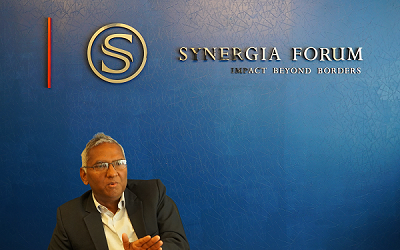Afghanistan – A way forward
April 24, 2019 | Expert Insights

Upendra Baghel visited Synergia Foundation to discuss India’s need for an independent and inclusive Afghanistan Policy. Mr. Baghel recently served as the Head of the Policy Advisory Unit of the United Nations Assistance Mission Afghanistan (UNAMA) and has also been an investigator for the International Criminal Tribunal for Rwanda (ICTR) (2000-2015).
Background
Upendra Baghel is a senior Indian Police Service officer who has served with the United Nations Assistance Mission Afghanistan (UNAMA) since December 2016. He was previously an investigator with the International Criminal Tribunal for Rwanda (ICTR) as well as Deputy Commissioner of Police/ Superintended of Police, Government of Karnataka from 1991 to 2000.
Additionally, he was deputed to various UN missions during his tenure as Deputy Commissioner, including the United Nations Angola Verification Mission II (UNAVEM II) (1995-1996) and the United Nations Mission in Bosnia and Herzegovina (UNMIBH) (1997-1998).
He was part of the investigations team which coordinated with the prosecutor’s office for the tribunal to gather evidence for the crimes committed in Rwanda back in 1994. Mr. Baghel described in detail the proceedings of the investigations, the role of an investigator in the tribunal and the manner in which leading political figures were convicted by the court based on the principle of association.
Analysis
The discussion was primarily focused on better understanding the present situation in Afghanistan, where Mr. Baghel is serving as the Head of the Policy Advisory Unit for the UN. During his tenure, Mr. Baghel has provided invaluable insights on police reforms, accountability and responsibility mechanisms as well as effective training for personnel.
India’s Afghanistan policy was the key point of Mr. Baghel’s deliberations. He stressed on the need for India to construct an independent, proactive policy towards Afghanistan. One such instance, he highlighted, was capacity building exercises with Kabul. He stressed on the cultural, religious and historical links between India and Afghanistan that needs to be strengthened. Citing the example of Afghan students studying in India, he reiterated the importance of imparting India’s secular, democratic and republican values on the students as a way of cementing a prosperous Indo-Afghan relation in the future.
The most impactful statement made was with regards to Afghanistan’s future. Referring to the ongoing US-Afghanistan-Taliban talks, he asserted that the future of Afghanistan will not be decided by the US, India or Pakistan, but by the people of the country. If a third-party country were to intervene and impose their version of the rule of law, it would surely fail. Therefore, Afghanistan should decide it's future.
Regarding India’s role, it is essential for the Ministry of External Affairs to formulate an active policy which goes beyond the regular day to day diplomatic services. India cannot and should not replace the US as the largest financier for development, largely because India spends the same amount of money in Afghanistan in one year as the US spends per week.
There is a need to engage with the Afghani press and the public, particularly for Indian scholars and think tanks, as they are open for having conversations which enrich their understanding of democracy, economy and even politics. Mr. Baghel’s articles have been published regularly in Afghanistan times, and they usually cover topics related to police reforms and security issues in and around Kabul.
Another hidden insight was the lack of engagement with the Taliban. India has not communicated with the Taliban, despite their growing influence as well as their changing perspectives of democracy. For better or for the worse, the Taliban will exercise a significant amount of influence in Afghanistan’s future, and the only way to safeguard India’s interests in the country is to engage with them.
Assessment
Our assessment is that Mr. Baghel’s experience in Bosnia, Angola, Tanzania, Rwanda and Afghanistan provides him with a unique perspective on common police reform and domestic security issues which plague most of South Asia. We believe that the suggestions are largely based on realities that exist on the ground and it would be wise to test these premises.








Comments